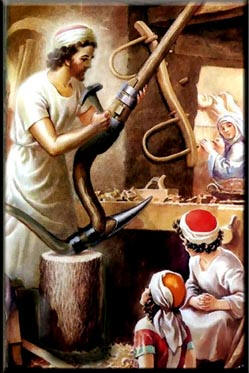The trademark of the Masons is an architect's compass and a builder's square.

 In
this self portrait engraving, Theodurus de Bry depicts himself with the symbols
of science.
In
this self portrait engraving, Theodurus de Bry depicts himself with the symbols
of science.Jesus Christ was a mason, a carpenter, who knew the laws of physics and understood that many of the myths in the Bible were impossible. Like many Masons, Jesus was killed for his scholarly approach to problems.
Matthew 11:29 Take my yoke upon you, and learn of me; for I am meek and lowly in heart: and ye shall find rest unto your souls. 11:30 For my yoke is easy, and my burden is light.
Jesus may have actually made yokes for teams of oxen because this is a very difficult, precise job that only a very skilled carpenter could do. The yoke had to fit the individual oxen perfectly, requiring sculptural skill as well as the ability to cut and fit lumber. Jesus would have to have a good relationship with animals in order to get close enough to them to measure their height, their width, the space between the animals as they worked as a team. This type of work would require Jesus to understand advanced carpentry, the hallmark of the Masons. We know that Jesus was a master builder because he is addressed at the tomb by Mary Magdalene as "Rabboni" which derives from the Hebrew "RB BNI", which means "master builder", apparently Mary's way of addressing Christ, much like many old school wives of doctors refer to their husbands as "Doctor". The practice of addressing a spouse by other than their Christian name is well known, for example, referring to one's spouse as "Dear" or "Sweetheart." The disappointing thing about Mary referring to Jesus as "Master Builder" in Hebrew is not that he referred to him by his professional title, but that she spoke to him in Hebrew, rather than Greek. Apparently Mary was not as upper class as Jesus, whose first language was Greek. Hebrew was the language of the lower class, being a mixture of Phoenician, which was a precursor to Greek, and Aramaic, developed during the Babylonian captivity when the ancient Israelites served as slaves and mixed their language, Phoenician, with their fellow slaves, Africans who spoke Aramaic which derives from Sanscrit.

 According
to the Masons, Jesus Christ is the son of the Supreme Architect of the Universe.
According
to the Masons, Jesus Christ is the son of the Supreme Architect of the Universe.The Masons were architects and builders of the churches, museums and churches of Europe. Their symbols prove that they were and are men of letters and art.